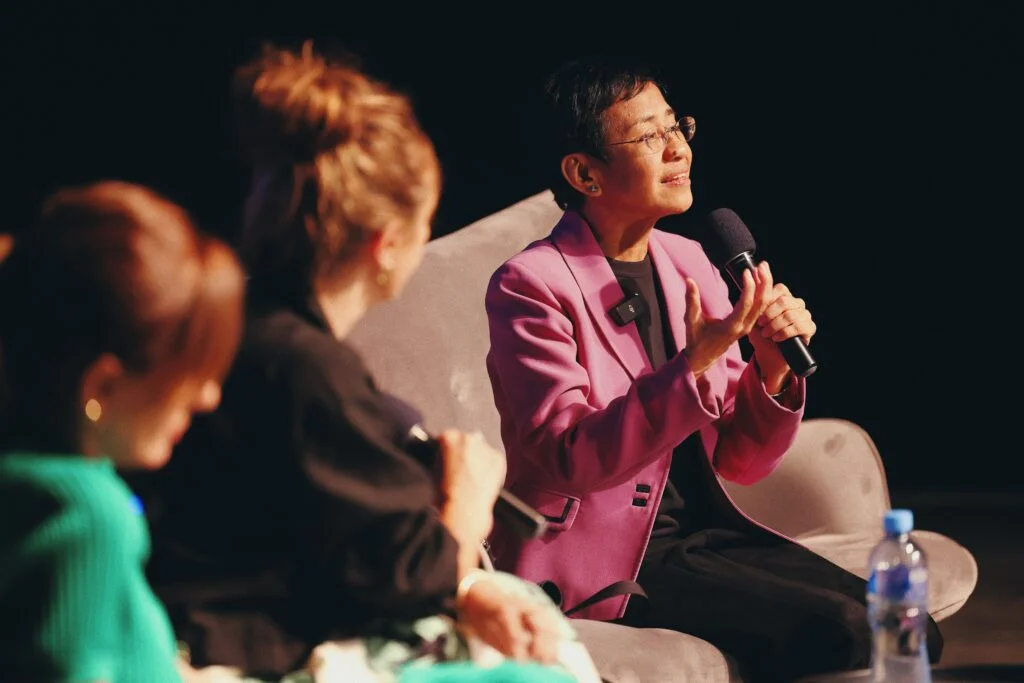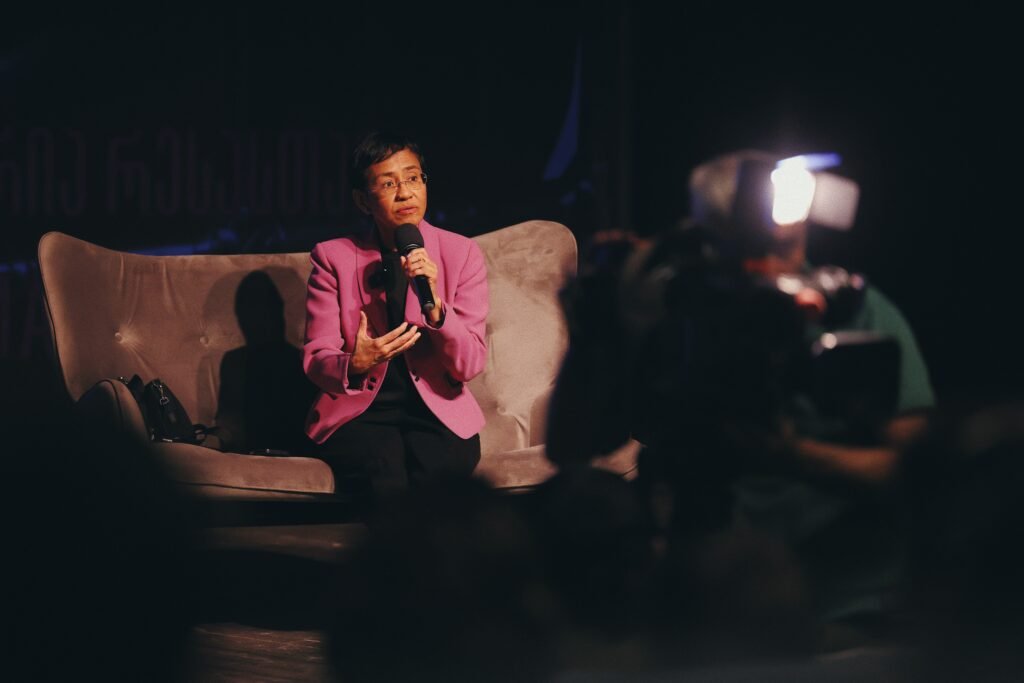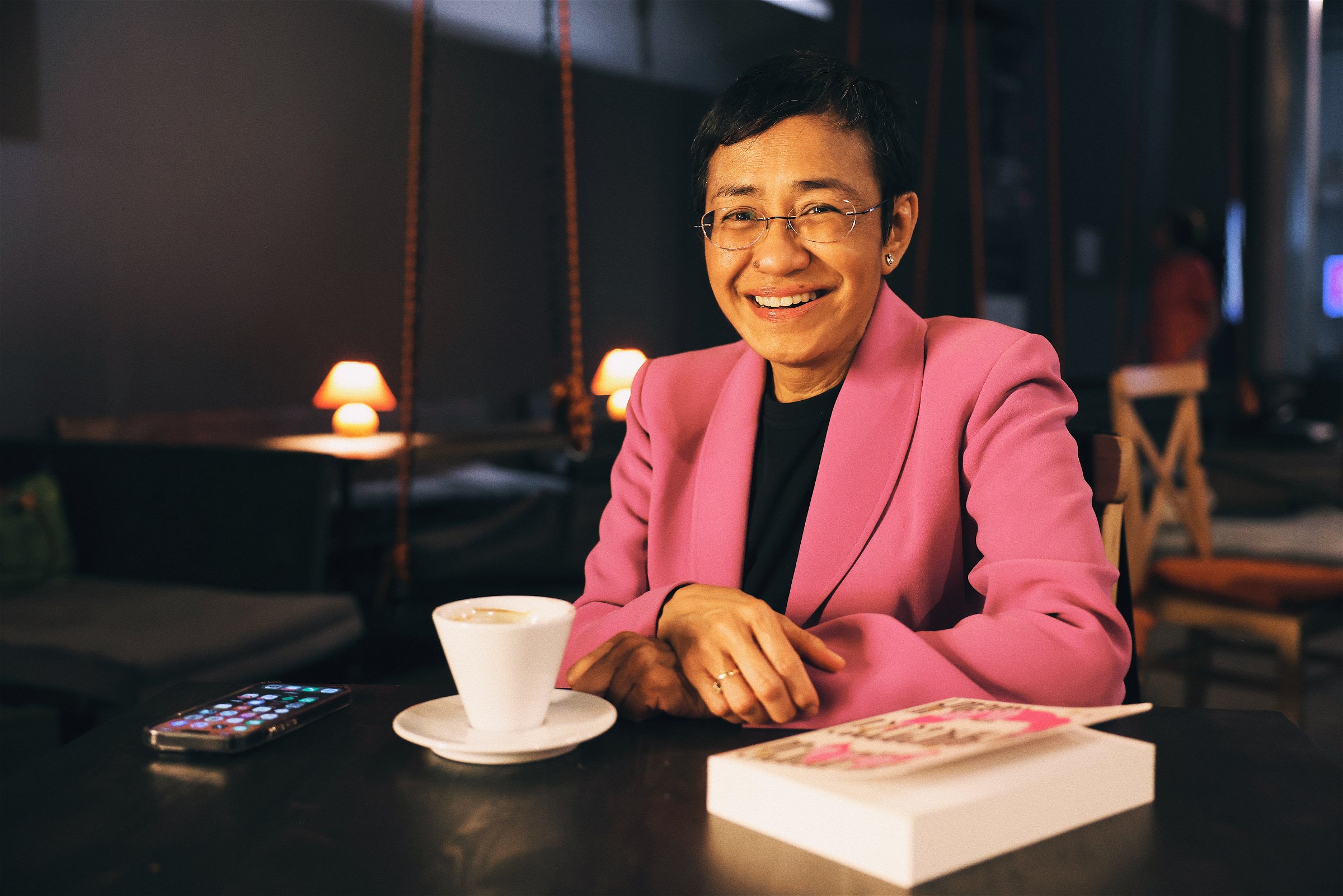‘What Are You Willing to Sacrifice for Truth?’ – Interview with Maria Ressa
It was not easy to track down Maria Ressa for an interview in Tbilisi. Ressa, 60, is known not only for her courage and commitment to the truth as a journalist – something that won her the Nobel Peace Prize in 2021 – but also for her super-busy travel schedule.
She stopped in the Georgian capital this June to tell those stories of courage, among others – whether on the panels of the ZEG Storytelling Festival or at the launch of her book – How to Stand up to a Dictator, recently translated into Georgian. The journalist had a lot to share with Georgians. Born in the Philippines and raised in the U.S., she has been a working journalist for nearly 40 years, leading CNN bureaus in Southeast Asia for many years and co-founding Rappler, a digital news outlet in the Philippines, in 2012. Her work at Rappler – investigating corruption, reporting on Rodrigo Duterte’s drug war, tracking manipulation – exposed Ressa to multiple threats, including sustained online hate and numerous arrest warrants that could send her to prison “for more than a hundred years.”
But more than discussing the past, Ressa came to Tbilisi to talk about the future – the future that worries her. The journalist has been anxious over what she calls the “death by a thousand cuts” of democracy worldwide, a prospect aided by technological advances and the virtual world increasingly filled with lies, hatred, and disinformation – a trend she has vigilantly resisted for years. Civil.ge spoke with Ressa via video call shortly after she left Tbilisi for Sarajevo. The journalist was again in a hurry, preparing to catch another flight, but still ready for a candid conversation in which she shared lessons from her past, offered tips to her Georgian colleagues, and explained why what happens in Georgia is “critically important.”
Read the interview below:
Civil.ge: Thank you for taking the time for this interview. We know you had a very busy schedule during your recent trip to Tbilisi. You arrived in the Georgian capital for various events, including attending the ZEG Storytelling Festival and launching your book, How to Stand up to a Dictator. What inspired you to write this book? And what’s the book’s main message?
Maria Ressa: The question everyone kept asking me was – when did I write this? I wrote this a lot during the lockdown. The attacks against me online began in 2016, so it’s been eight years. But early on, what everyone kept asking is, how do you find the courage? And I guess that’s where it came down to. Courage isn’t something that you find. It’s something that is built into who you are. And I think everyone is courageous, it just goes down to the values that you have.

Why did I write the book? Because it was the beginning of trying. It’s hard to explain where courage is because it wasn’t courage to me. It was the only thing I could do because I am who I am if I believe in these values. You don’t believe in the values only in the good times, in fact, it’s the bad times that test who you are and whether these values are real for you. And they become very real. In that sense, I almost have to thank the Duterte administration because they tested us and they made us stronger in a weird way. Part of my beliefs and my values come from being an immigrant, from having lived through being a nerdy kid. When you’re new in a culture, you don’t understand the signals, you really listen and you learn from everybody. And it was great training as a journalist – in the very beginning.
In every chapter of the book, the title of the chapter gives the macro picture of what the chapter is about. But underneath, in italics, are the lessons, the personal lessons I learned every step of the way, and it was really good, it was thought-provoking. During the lockdown, what better exercise to go through? For example, chapter one’s title is The Golden Rule. Because when I was much younger, how do you make decisions in your life? You don’t make them one by one. And what is your guiding principle? For me, it was the Golden Rule, so that became the title of the first chapter. The Golden Rule is “do unto others as you would have them do unto you.” If you look at every single world religion, they have something like this. In Islam, they would call it jihad, but jihad is a personal battle, it is fighting to be good, the battle in your conscience.
I cannot tell you how important planning is to manage your fear.
Maria Ressa
The title is called the Golden Rule. But the subtitle is what I learned when I moved to the US, which is always Make the Choice to Learn. Whether I’m facing a crisis or whether I ask – do I turn right or do I turn left – what matters is which road gives me more possibilities to learn. That was the idea behind it – maybe because I also realized the trend: more and more journalists, more and more people, citizens in a democracy are going to have to learn to draw the line. That’s the phrase I use: I say draw the line, then hold the line. The line is your rights as a citizen in a democracy, something that you don’t compromise on so that expediency, power, and money can’t corrupt who you are.
The lines were drawn for me when I was much younger. One of the things I loved was this quote – I’m a science fiction fan – by Ursula le Guin, and I’m going to paraphrase her, where she basically says that everyone looks at the mage, the senior mage, an older person, and thinks that the older you get, the more power you have, the more choices you have. But that’s not true. And I love this part: she basically said everything was decided by the little choices you made when you were younger and ever narrower the path becomes until you only have one choice. So, if I am who I am, I only felt I had one choice. It was never courage in my mind. It was just walking the path I’d always walked on.
You see what’s going on in Georgia now: foreign agents law was introduced, repressions have been intensified, and Georgian journalists and Georgian activists are struggling between courage and apathy right now because it’s all kind of new for them. But you’ve been in journalism for almost four decades. You’ve seen it all. You have exposed corruption. You have reported on Duterte’s drug war, and you have repeatedly become a target, including through multiple arrest warrants and hate you keep receiving online. Your Georgian colleagues and your colleagues elsewhere who are battling against authoritarian tendencies would use some of your insights, some of your experience in how to cope, how to keep going – because you kept going, you kept doing more for truth and journalists globally. Are there any lessons that you can share, for example, with your Georgian colleagues?
I was really impressed with both the civil society groups and the journalists I met. I sit on the board of Coda Story, so through Natalia Antaleva and the other journalists I met, I think Georgians, like the Taiwanese, have come of age under the shadow of a dictator – of Russia.
You are like in Taiwan. I never expected Taiwan to bow, to lose in elections. I never expected democratic forces to lose in elections, even though China was pressuring Taiwan and had pumped it full of disinformation because the Taiwanese were cleaved out of China. They were born out of resistance. And in many ways, Georgia reminds me of Taiwan. I’m more familiar with Taiwan in my part of the world. What I thought was interesting with the people I had spoken with in the very short time I was in Georgia: look, your challenges are real. You have not just Russia, you also have China, Chinese disinformation, and you have China, the country, because it’s all connected in the infrastructure that you are dealing with. You’re right on the border, Russia is right on the border. But in 2008, you were the first target of Russia, and you pushed them back. And when Crimea fell, Georgia held the line.
I expect that you may have more lessons to teach us, Filipinos because we are a country that has been molded by colonialism. The joke in the Philippines is that we spent 300 years in a convent and 50 years in Hollywood, meaning 300 years of Spanish colonial rule and 50 years under America. Our criticism of ourselves oftentimes is that we’re too kind – we worked with our colonizers and never had a revolution. People Power [Revolution] in 1986 was the first time. In that sense, even though I was only in Georgia for such a short time, I suppose there’s a real difference in the feel, character, and ability of resistance.
Part of the reason I went to Georgia is because every single battlefront, every single country we lose or gain tips the balance for or against democracy. And Georgia is critically important.
Maria Ressa
Then, the other part is what we learned in Rappler – that planning is everything. We planned. In one of the chapters in the book, the subtitle is Embrace Your Fear. The title is Don’t Become a Monster to Fight a Monster. In Rappler, what I wanted to do was to prepare for a worst-case scenario. We, the four founders of Rappler, imagined our worst-case scenarios, and then we imagined what we would do if that happened. We imagined this, and then we workflowed it. And the last part is we drilled it because Rappler is 100 to 120 people in the office at any time, if they come in, I wanted people to know their rights, and we workflowed our reaction to it. I cannot tell you how important planning is to manage your fear. Because everyone is afraid, but if you have your systems in place and then you’re prepared for a worst-case scenario, anything else that would happen is going to be better than that.
You spoke about the differences between Georgians and Filipinos, but I think in what you describe in your book, there are many similarities too. For example, it’s their obsession with Facebook. Georgia also lives and exists on Facebook. And over the past years, you focused a lot on disinformation, over the responsibilities of big social media platforms and that they should do more about it. But what do you think the media, the journalists, can do more? Can we simply continue doing what we’ve been doing, telling the truth? Or should we also adapt somehow not to become a part of hate, part of polarization? What should we be doing differently?
I think you should be doing more. There are many global studies now about the impact of technology on people because of its effect on the vote. The United States, for example, has a group called CISA [Cybersecurity and Infrastructure Security Agency], which is looking at voting systems.
But what they don’t protect against is the manipulation of the emotions of the people who are voting, the manipulation through our fear, anger, and hate that changes the way we feel, which changes the way we look in the world, and then it changes the way we act. That is what we spent a lot of time on in the Philippines. We showed data. It was really boring when we first came out with the stories in 2016, but then Filipinos kept going back to it. They kept looking at it in a different light.

When you’re new in a culture, you don’t understand the signals, you really listen and you learn from everybody. And it was great training as a journalist – in the very beginning.
Maria Ressa
We need to understand that this technology used by Facebook and other social media platforms today is surveillance for profit. They manipulate us to be our worst selves, it incites fear, violence, and hate. We can’t normalize that because – I think Georgians also know this – there is goodness in people. The goodness of human nature is there, and yet the incentive structure of technology doesn’t allow that. When you add generative AI, the large language models, and the chatbots, you’re no longer going to be able to tell what’s real. You’re not going to be able to know whether the person you’re talking to in Zoom is a real person.
So why am I saying none of the technology is anchored in facts? Without facts, without the certainty of a shared reality, we all become weaker, citizens become weaker because we distrust everything, and we don’t know what to trust. You need to form your circles of trust because when citizens don’t know, they cannot trust anything, they distrust everything. That is perfect for a dictator, perfect for an authoritarian leader because then the citizens can’t mobilize.
One more question: in 2021, you shared the Nobel Prize with your fellow journalist Dmitry Muratov. And in your Nobel Prize lecture, you said that you were there as a representative of all journalists worldwide who are sacrificing so much for truth, and it was for the first time in almost a century that the price went to a working journalist. What did this kind of recognition mean to you personally? What did it mean for your work? And what do you think it meant for journalists worldwide?
Let’s start with the end. I think that it was a recognition. Democracy globally has retreated for the last 17 years, and almost hand in hand with that are the increased attacks, harassment, jailing, and killings of journalists. In fact, in 2023, the number of journalists killed increased by 44 percent because of Gaza. Ukraine was in 2022. Then Gaza was in 2023. It’s been a really difficult time to be a journalist. We’ve had to sacrifice a lot more. In the book, the question I urge everyone to ask – because the cell phone is with everybody, so the battle is very personal – is: What are you willing to sacrifice for the truth? Because I think this is what journalists and now Georgians are going to have to handle.
We have to rotate the fear because when you’re leading a team, you’re supposed to know everything – which you don’t. You’re supposed to be the super girl – which you’re not.
Maria Ressa
So in the big picture, it was a recognition of everything journalists have had to go through. I’m lucky I’m still here even though I have to ask the Supreme Court for permission to travel after the Nobel Lecture. They’ve given me the right to travel. They had turned it down four or five times before that, so I was feeling the walls closing in. But then that impact was that it gave me back some of the freedoms that I had thought I lost.
The second part is for Rappler. It really is. This isn’t something anyone can do alone. My co-founders, there are four of us, we cope with fear because anyone under attack is afraid. If you are a rational human being, that fear is actually good because it makes you prepare. We have this thing among the four of us, my co-founders and I, that only one of us can be afraid at a time. We have to rotate the fear because when you’re leading a team, you’re supposed to know everything – which you don’t. You’re supposed to be the super girl – which you’re not. You pull your team together.
What does it mean? I think we’re going to go through rougher times ahead. The sad thing is that this book was published in 2022, the same month that Chat GPT was released. And it didn’t get better. It’s gotten worse. And so I feel like the window is closing. Part of the reason I went to Georgia is because every single battlefront, every single country we lose or gain, tips the balance for or against democracy. And Georgia is critically important.
Interviewed by Nini Gabritchidze/Civil.ge
This post is also available in: ქართული
